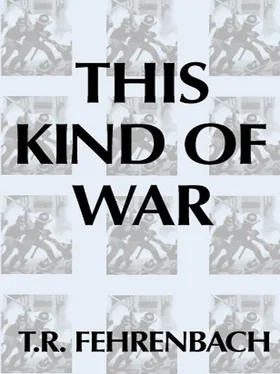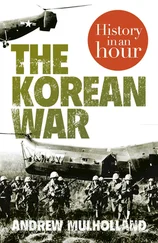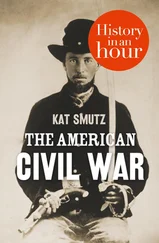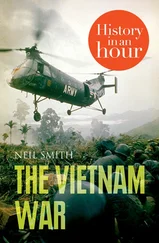In Seoul there was no more talk of rain and rice. As word of the Communist attack spread, the people rose in a spasm of patriotic fury. There was relief in their fervor, too—all Koreans had considered the division of their country unbearable; from cranky old Syngman Rhee in the government palace to the landless peasant in the south ran strong agreement on that issue.
Now the puppet state to the north had attacked, and it would soon be over. North Korea would be overrun by the victorious troops of the Taehan Minkuk. It would be united again. The people, fed on statements by their government and the broadcasts of the Voice of America, believed implicitly in their army. They believed implicitly in the mountains of military aid the Americans had promised, and in final victory.
At 0900 Kimpo Airport reported that it was under air attack, and at mid-morning Russian-built yak fighters screamed over Seoul's main avenue, strafing—but no one understood the significance of this. The only people in Seoul who were shaken by the appearance of the enemy aircraft were some members of the American colony—who knew the true status of the ROK forces where equipment was concerned.
By midday, ROK Army units were streaming north through Seoul. They came through in long columns of trucks, rail cars, jeeps, bicycles—and oxcarts. To the people of Seoul the oxcarts did not seem odd. Nor did they seem to notice that their army had no combat vehicles, such as tanks.
The soldiers sang as they poured through Seoul, and vast crowds of civilians gathered at every street corner, cheering them. From Taihan Mun to the solid stone of the railway station, Seoul went wild with emotion.
Peasants in traditional white, elderly yangban graybearded in black hats, and neat businessmen in Western suits screamed their encouragement. The sight of the khaki-clad ROK troops moving north suddenly united all the segments of Seoul in one vast frenzy.
Manzai! Victory! Manzai! Unification! Manzai! Manzai!
All day Sunday, the khaki columns rode, pedaled, or limped by, moving north.
But among the American colony of Seoul, which had its women and children far from home, men were growing nervous. A fish merchant named John Caldwell, who had once been attached to the embassy staff, called a high embassy official, asking for news, just after the yak fighters had been reported over Seoul.
The embassy man was very angry. He said: "John, this thing is serious. They strafed an American plane at Kimpo. That's destruction of American property!"
At four o'clock on Sunday afternoon Ambassador John J. Muccio went on the air over the embassy radio station, WVTP, to reassure the American Uijongbu area, trying to hammer out a plan of action. Chae was certain that something had to be done very quickly, or it would be too late.
In that surmise he was correct—but what he would do was wrong. It would lose the war. colony. He stated that there was no reason for anyone to be afraid and that the ROK army had already contained the Communist offensive. There was to be no evacuation.
But KMAG officers, who were getting frantic reports by telephone from the length of the 38th parallel, were hardly so sanguine. They began to argue with the ambassador, who was still in command. At least the women and children should be flown out, many of them said.
All afternoon and far into the night, an argument raged. Ambassador Muccio cannot be blamed for his attitude. A diplomat, he was suddenly in command during a military disaster, with no instructions from home, no clear-cut policy, no idea of the course the United States should follow. Muccio felt he must continue to show confidence, and at the same time he sincerely believed the United States would not become involved, at least not directly.
At midnight, Muccio suddenly yielded to the pleading for evacuation. But he would not listen to a plan for removal of the American civilians by air; Communist planes were in the air, and if one of them should shoot down a plane loaded with refugees it would become an international incident.
There was a small Norwegian ship at Inch'on, and all 682 women and children would have to sail for Japan aboard this. The Norwegian ship carried a full load of fertilizer, and it had accommodations for only twelve passengers.
On this point Ambassador Muccio, a tall, dark, bespectacled man, given to wearing bow ties, was adamant. Generally, too, he was set against any evacuation, since he felt that even if the Inmun Gun should by some miracle capture Seoul, the Americans there would be granted diplomatic immunity by the Communists. The British, who had recognized Red China, also planned to keep their diplomatic staff in Seoul.
The British, some of whom would not live to see England again, also did not fully understand the nature of the Communist foe.
Radio Station WVTP ordered all dependent American women and children to assemble at certain designated locations to be picked up by embassy busses for the trip to Inch'on. From there the tiny freighter Reinholt would take them to Kokura, Japan.
Three days later, when the Reinholt docked, fifty of its passengers had to be removed to hospitals by stretcher. Exposure, lack of food, crowding, and the horrible odor of commercial fertilizer had prostrated the majority. But at that the women and children were lucky.
On late Sunday, with the sound of the guns coming ominously closer to the vital center of Uijongbu, General Chae held a hurried conference with his major subordinate commanders. Chae had formed his plan of battle.
Yu Jai Hyung's 7thDivision, which was holding both approaches to Uijongbu, was to swing to the west, onto the Tongduch'onni road, up which it would attack at dawn.
The arriving 2nd Division, under Brigadier General Lee Hyung Koon, would take over the entire P'och'on sector, and attack up the right-hand road in a coordinated effort with that of 7th Division.
Counterattacked, the advancing Inmun Gun would be halted short of Uijongbu, and, with luck, destroyed.
Brigadier General Yu accepted his orders, and began to move his units westward at midnight.
Lee Hyung Koon did not buy the plan at all. He explained that his division was still on the road and that only his Division HQ and two infantry battalions had closed in on Uijongbu. He said he could not possibly deploy the entire division north of Uijongbu by morning—it would not even have arrived.
Chae told him, "You will attack with whatever troops you have available."
"But I shall have to attack piecemeal, throwing in small units one at a time. And my men cannot march all night and fight at dawn. We must defer the counterattack until all my division, or at least most of it, is in position!"
Chae said, "No. You are overruled. The attack will proceed as I have planned."
Lee looked at Captain Hausman, the American KMAG officer. Hausman agreed with Lee, and said so. Lee's 2nd Division would be in no position to make a major effort; in fact, such a commitment risked its destruction.
But Hausman had no command here. He was an adviser lent by a friendly government, and at the moment even his status was not clear. Even had he been a major general, he could not overrule, and would not have felt justified in an attempt to overrule, the ROK chief of staff.
Chae, his huge bulk sweating, would listen to no more argument. Furious, Geeral Lee departed for his command post at Uijongbu.
The hours of remaining darkness passed swiftly. General Yu, with his weary, half-demoralized troops strung out along the Tongduch'on-ni road after many of them had made a night march, gave orders for a counterattack to be launched at daylight, and when the orders had gone out, paced up and down inside his CP, watching the intermittent flashes of gunfire to the north. At dawn, he would see to it that his 7th Division attacked.
Читать дальше












